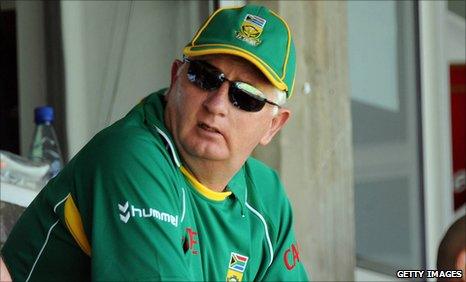Can Duncan Fletcher learn the Indian way?
- Published

Fletcher has recently acted as a batting consultant for South Africa
History is no guide when it comes to coaching India. You can be a cricketing genius or a coach with an enviable record; you can be highly qualified or a fresher; young or old; you can be an Indian or an outsider.
But none of this matters unless your "likeability factor" is high. The players have to like you, the media have to feel involved. Officials want flexibility and regular acknowledgement that they are the bosses.
Coaching is the least of the tasks. Depending on how he approaches his job, the Zimbabwean Duncan Fletcher, 62, will either have his hands full or have so little to do that it will be a breeze.
Of India's three recent foreign coaches, John Wright has written about how he was met with a limousine at the airport when the Indian team won, and forced to take a taxi on his own when they lost. Gary Kirsten focussed on relationships, much in the manner Wright had done, while in between, Greg Chappell, a better thinker than either, began well but was quickly dragged down to the level of fighting his battles in the media and letting his strong likes and dislikes show.
Fletcher's appointment answers, for the moment, the question that followed India's World Cup triumph: would the victory Cup do for homegrown coaches what it did for their players and earn them recognition among the best in the business? Half the coaches at the tournament were from either Australia or the West Indies. Nine of the 14 countries had foreign coaches.
India are the world champions and the number one ranked Test team, so any new coach would be in a lose-lose situation.
If India retain the Test position, that is what they are expected to do, and if they slip, then the coach will cop part of the blame. India are number two in the one-day rankings, and if they climb to the top, that is also something they are expected to do as world champions.
Fletcher will have to ensure that the team keeps running smoothly merely to stay in the same place, but he will also have important input into the development of the next generation as the team approaches a transition phase.
Sachin Tendulkar cannot go on forever, and India will also have to prepare for the conclusion of a few more careers, Rahul Dravid, V V S Laxman, Zaheer Khan, all of whom played key roles in getting them to their current position of strength.
Fletcher's record as England's coach was excellent for the first six of his eight years in charge, yet one cannot shake away the feeling that the Indian board lost a chance to blood a homegrown candidate who could hold his own in the company of Fletcher, Andy Flower, Tom Moody and other names discussed whenever an international coaching vacancy arises.
This might have been a good time to add an Indian to the list of the usual suspects. He need not have been an international star but must have had the confidence of the players and the ability to operate both the iron hand and the velvet glove.
Robin Singh and Venkatesh Prasad were the obvious candidates, having worked with the team successfully as fielding and bowling coach on the 2007 tour to England.
But if the board wanted someone who would not have to waste time getting to know the players or the peculiar Indian way of doing things, the great Anil Kumble was also available.
Kirsten has already laid down the formula for success. He was low-key, accessible and the players saw him as a friend. The Indian team loathe the attention-grabbing, public blood-letting style that Chappell adopted.
Indian umpires have not made an impact internationally in recent years, and neither have Indian coaches. Development of the game is a multi-layered process, and the cricket board must take the responsibility to place hard-working and result-oriented officials on and off the field on a platform where they can compete with the best in the world.
Still, foreign coaches have worked well in India. Fletcher came across as a no-nonsense professional when he was in charge of England. But he will have to temper his professionalism with the occasional compromise. That is the Indian way.
A telephone call to Kirsten, whom he has coached in the past, would be a good idea.
Highlights - India record historic World Cup win